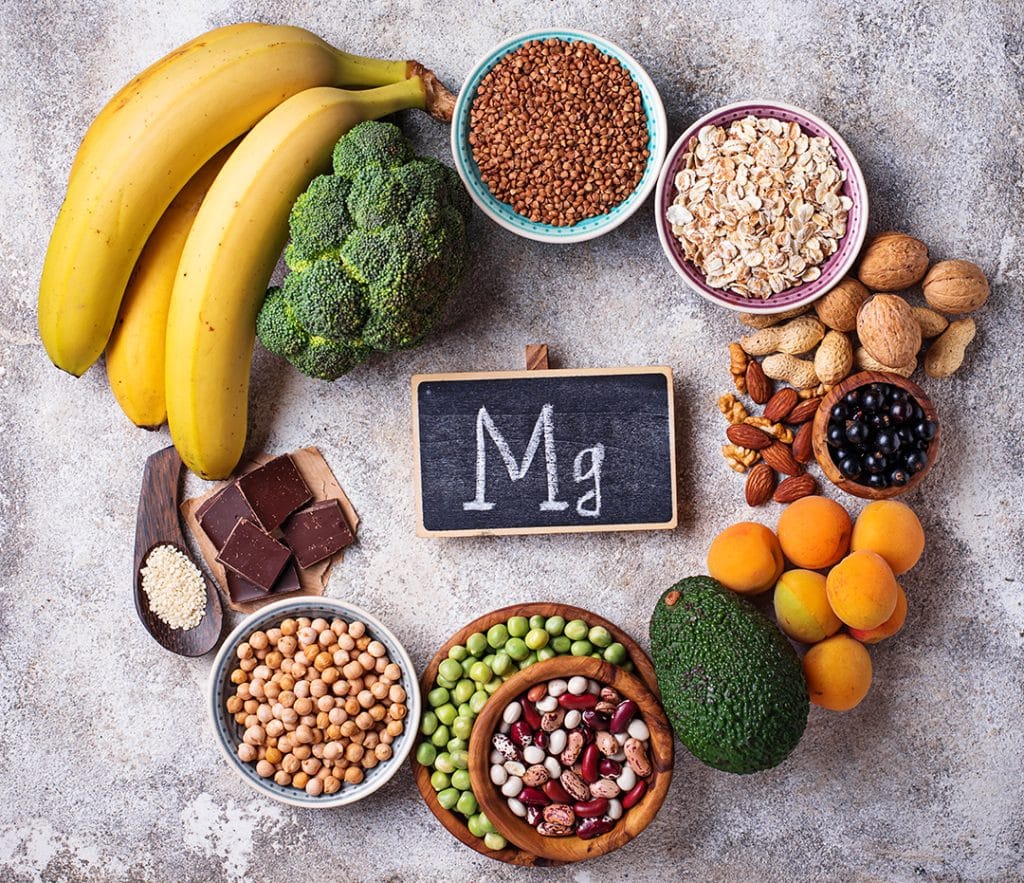Want to improve your athletic performance? Kick pain and muscle aches to the curb? Stay mobile and strong as you age? The secret could be as simple as using magnesium to boost muscle health.
Magnesium (Mg) is an essential mineral that plays a vital role in many body functions – in fact, over 300 biochemical reactions in the body require magnesium to occur. Along with regulating blood sugar levels, building bone, and keeping our hearts beating, many of those functions relate to how our muscles and nerves work.
Whether you’re an athlete looking to enhance performance, someone who regularly experiences muscle cramps, or simply want to maintain optimal muscle function as you age, understanding the benefits of magnesium – and leveraging this simple supplement – could help you reach your health goals faster.
Read on to learn five reasons why magnesium powers muscle health.
The Role of Magnesium in the Body

Magnesium is one of five essential minerals in the body, along with calcium, phosphorus, potassium, and sodium. These five minerals, along with many others called “trace elements”, are crucial for triggering and regulating countless bodily functions and chemical reactions that keep us healthy.
Here are some key roles magnesium plays in the body:
> Energy Production
The body needs magnesium to both produce and store the core form of energy, ATP (adenosine triphosphate). It does this by converting food into ATP energy, then ensures that all body cells have the power they need to function.
> Protein Synthesis
Mg is necessary for the synthesis of proteins, which are essential for muscle repair, growth, and overall cellular health.
> Muscle and Nerve Function
Magnesium regulates muscle contractions and nerve impulses, helping muscles relax and preventing cramps and spasms. It also supports the proper transmission of nerve signals.
> Bone Health
About 60% of the body’s magnesium is stored in the bones, giving us strength and structure. It also plays a role in calcium regulation, which is crucial for bone health.
> Heart Health
As a vital mineral, magnesium is critical for cardiovascular health as it helps to maintain normal heart rhythm and blood pressure levels. It also relaxes blood vessels, which can reduce the risk of hypertension and heart disease.
> Immune System Support
The body also uses magnesium in various functions of the immune system to keep it strong and responsive to infections and other threats.
> Blood Sugar Regulation
Magnesium plays a role in insulin metabolism and helps regulate blood glucose levels. This is particularly important for preventing type 2 diabetes, or managing diabetes if you have already developed it.
> Detoxification
The liver uses magnesium to help eliminate toxins and heavy metals from the body.
> DNA and RNA Synthesis
Magnesium is required for the synthesis of DNA and RNA, the genetic material of the body. This is necessary for new cell growth, reproduction, and repair.
> Mood Regulation
Rounding out its many uses, magnesium has a calming effect on the nervous system and can help reduce symptoms of anxiety and depression by supporting neurotransmitter function. It can also help you keep a regular sleep schedule.
5 Reasons Magnesium Boosts Muscle Health

As we can see, magnesium is absolutely essential for our health – especially muscle health. Without adequate magnesium, our muscles can’t relax properly, leading to cramps, spasms, and general pain or discomfort.
The good news is that understanding how magnesium supports the body and making an effort to get the right amounts of magnesium daily can help you build healthy, supply, strong muscles for years to come.
Let’s take a closer look at the many reasons why magnesium is so important for healthy muscles:
1) Magnesium Supports Muscle Function
As we learned above, the body needs magnesium for muscle contraction and relaxation. Here, it acts as a natural calcium blocker – when calcium enters muscle cells, it triggers a contraction. Magnesium competes with calcium for these same binding sites, which allows the muscle fibers to relax.
If you have inadequate magnesium levels, you may experience tense or tight muscles that are stuck in the contracted state. With enough magnesium, however, you’ll experience smooth, coordinated, pain-free muscle movements.
2) Magnesium Prevents Muscle Cramps and Spasms
Muscle cramps and spasms are often caused by an imbalance of electrolytes in the body – especially calcium, potassium, and magnesium.
As we learned above, magnesium is needed to regulate and balance the levels of calcium and potassium so muscles can properly relax after a contraction. With a magnesium deficiency, however, muscles don’t get “released” from their contracted state and they cramp up. Thankfully, these muscle spasms can be eliminated by simply restoring electrolyte balance with magnesium.
3) Magnesium Has Anti-Inflammatory Properties
Chronic inflammation is one of the biggest culprits of poor muscle function and slow recovery. Whether you’re an active athlete or someone struggling with chronic pain, too much inflammation can slow down your healing and sabotage your muscle health. That’s where magnesium comes in.
Magnesium has powerful anti-inflammatory properties that can help reduce inflammation and promote overall muscle health. How? It inhibits inflammatory cytokines and reduces oxidative stress, two major contributors to muscle inflammation. By reducing inflammation, magnesium helps protect muscles from damage and supports quicker recovery after intense exercise, injury, or general activity.
4) Magnesium Increases Muscle Endurance & Stamina
Perhaps you love sports, or even a long hike on the weekend. To enjoy these hobbies, you need your muscles to “stay in the game” as long as you want to. This all comes down to muscle endurance, and magnesium can help.
Magnesium plays a significant role in energy production at the cellular level, creating the body’s primary energy currency form of energy – ATP (adenosine triphosphate). The more magnesium you have, the more efficient your body is at turning your food into energy. This gives you a boost in stamina, allowing your muscles to work for longer periods of time without getting tired.
5) Magnesium Enhances Muscle Recovery
After strenuous exercise, your muscles need time to repair and recover. Magnesium supports the entire muscle recovery process by reducing inflammation so tissues can heal, supporting protein synthesis for energy to repair, and helping to rebuild new muscle tissue. It also helps regulate blood sugar levels to give muscles a steady supply of the glucose they need for recovery.
Magnesium can also help to relieve the aches and soreness common after intense workouts so you can get back to your active lifestyle faster and with less discomfort.
How to Know if You’re Getting Enough Magnesium
It’s clear that adequate magnesium levels are the key to healthy muscle function. But how do you know you’re getting enough magnesium?
The recommended daily intake of magnesium varies depending on age, gender, and life stage. But, on average, adult men typically need around 400-420 mg of magnesium daily, while adult women need about 310-320 mg. Pregnant and breastfeeding women require slightly more, at about 350-360 mg per day.
There are two main ways to ensure your magnesium levels are up to par:
Eat a Magnesium-Rich Diet

Getting a good source of magnesium through your diet is crucial for maintaining muscle health. Here are some of the best magnesium-rich foods to include in your meals:
- Leafy Green Vegetables: Spinach, kale, Swiss chard, and other leafy greens are excellent sources of magnesium and antioxidants.
- Nuts and Seeds: Almonds, cashews, pumpkin seeds, and sunflower seeds are packed with magnesium and healthy fats for muscle repair.
- Legumes: Black beans, chickpeas, and lentils are great plant-based proteins with high magnesium levels.
- Whole Grains: Brown rice, quinoa, and oats are magnesium-rich complex carbohydrates that support muscle health and energy.
- Fish: Fatty fish like salmon and mackerel contain high levels of magnesium along with omega-3s and other essential nutrients.
- Dark Chocolate: Believe it or not, chocolate can be a delicious source of magnesium. Be sure to opt for high quality dark chocolate (70% or higher) and avoid high-sugar or dairy-based varieties.
Boost with a Magnesium Supplement

Many of us struggle to get enough magnesium through diet alone – an estimated 75% of Americans eat a diet too low in magnesium for optimal health. While it can be hard to fill your plate every day with enough magnesium-rich foods, supplements are a simple and effective way to fill in the gaps and stay on track.
Aceva Triple Mag is a high-quality magnesium supplement that provides a potent dose of this essential mineral. Rather than offer just one version of magnesium (there are several with different functions), it combines three easy-to-absorb forms of magnesium designed to support muscle function, reduce cramps and spasms, and promote overall muscle health.
Strengthen & Protect Your Muscles with Magnesium

Magnesium is one of our most powerful allies in maintaining muscle health, preventing cramps and spasms, reducing inflammation, increasing endurance, and enhancing recovery.
If you’ve been experiencing muscle soreness, frequent muscle cramps, muscle fatigue, or other muscle-related issues, it might be time to take a closer look at your magnesium intake.
At AlignLife, our team is here to help you manage your musculoskeletal health the holistic way. Chiropractic adjustments can help restore balance through the body and alleviate pressure on the muscles and nerves, while our functional nutritionists can guide you to the best diet and supplement plan based on exactly what your body needs.




